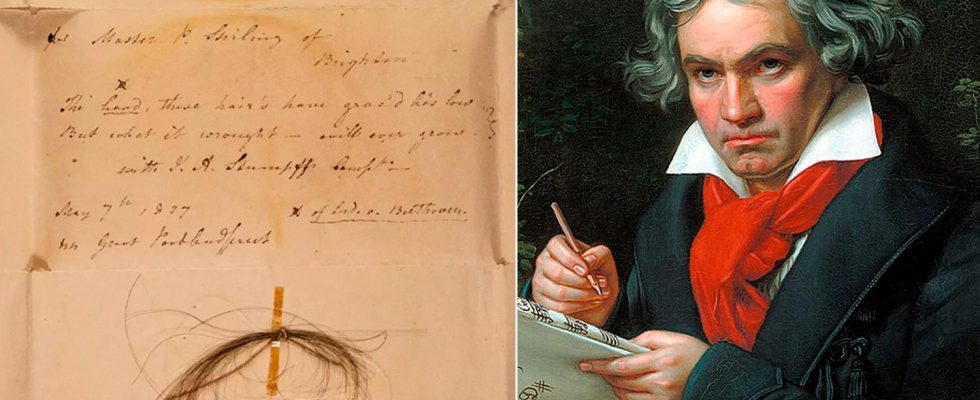Published: Just now
Almost 200 years after Beethoven’s death, researchers have examined his saved locks of hair.
The analysis revealed a dark family secret.
– I love this report. It feels a bit like traveling back in time, says geneticist Robert Green.
The German composer Ludwig van Beethoven died – aged 56 – on March 26, 1827. It has already been established that he had severe stomach pains and was deaf.
In a letter to his brothers already 25 years earlier, he had pleaded for his remains to be examined. Beethoven lost his hearing early and wanted his ailments to be studied “as far as possible, so that the world will be reconciled to me after my death”.
Now the scientific world has made him willing.
Examined tufts of hair
Eight saved locks of hair have been examined by researchers at Cambridge University in the UK, among others. Their findings were presented on Wednesday in the journal Current biology.
Two of the tufts of hair would turn out to belong to people other than Beethoven, another was too damaged to be examined.
But five of the samples matched each other genetically. The researchers were able to determine that they belonged to the same man and that 99 percent of the genetic material was of European origin. In addition, the most well-preserved lid yielded genetic matches to the German region of North Rhine-Westphalia.
“Compelling Evidence”
The researchers thus felt safe. They had Beethoven’s hair.
The conclusion is supported by Ed Green, an expert on historical DNA at the University of California, Santa Cruz.
– The fact that they had so many independent locks of hair with different histories, all of which matched each other, is convincing evidence that this is indeed DNA from Beethoven, he says to the New York Times.
The DNA analysis would bust several myths, provide clues about the composer’s death and reveal a dark family secret. Other questions would remain unanswered.
check The diseases
The researchers did not find definitive answers as to why Beethoven became deaf or had stomach problems.
– However, we discovered a number of clear risk factors for liver disease. We also found evidence of a hepatitis B infection in his final months. This likely contributed to his death, says Johannes Krause, a professor at the Max Planck Institute in Leipzig, Germany and one of the co-authors of the report. according to CNN.
check The drinking
Letters from both Beethoven himself and his friends have previously revealed that he regularly drank alcohol. One of the friends wrote that he downed at least a liter of wine with lunch every day. The drinking, together with the other diagnoses, may have become “the perfect storm”, writes CNN.
– If his alcohol consumption was high enough for a long enough time, the combination with his genetic risk factors constitutes a possible explanation for his cirrhosis, says Tristan Begg, the report’s lead author, to the television channel.
check The myths
Previous research has suggested that Beethoven was lead poisoned. The assumption was based on previous analyzes of one of the saved locks of hair. However, it turned out to belong to a woman.
The DNA tests could also, writes the NY Times, establish that Beethoven was not black, as some people claimed. In addition, a family in Belgium was beaten to death. The family’s last name is Beethoven and has proudly proclaimed that they are the composer’s descendants. They are not, it turns out.
check The family secret
The DNA profile of the curls was compared with living people with confirmed kinship to Beethoven. But some of them did not match the male Y chromosome. It suggests that an extramarital affair on the father’s side resulted in a child. However, the researchers do not know exactly when.
The study is praised
The investigation into Beethoven’s hair is praised by several independent experts.
– I love this report. Taking aim at an extraordinarily famous person – it feels a bit like time travel. It’s not so much about the specific questions being answered, but that they were able to dismiss some things, look for others, and come to some really new conclusions, Robert Green, a geneticist at a hospital in Boston, told the NY Times.
